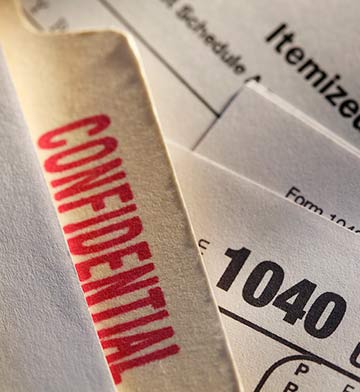Protect Yourself from Identity Theft
Identity theft is a growing problem that is a potential risk to everyone. Take steps to reduce the chances of having your identity stolen.
HOW IS INFORMATION STOLEN?
Thieves rely on old-fashioned techniques like stealing your mail or wallet as well as high-tech methods like malware, phishing phone calls and emails, and hacking into systems that store customer, patient, or employee data.
Minimize your risk
- Do not carry your Social Security card with you, and question those who ask you to provide your Social Security number. Why do they need it, and how will it be shared?
- Never give out your Social Security number or account numbers by phone unless you’ve initiated the call. If you receive a call that seems legitimate, return the call at a verifiable number before providing personal information.
- Use a locked mailbox, and stop mail delivery when you are out of town. When mailing sensitive documents, drop them off at the post office.
- Destroy personal documents with a cross-cut shredder.
- Protect your computer and other devices with a firewall, anti-virus software, or a program that removes spyware. Visit or download content only from trusted websites. If you are prompted to provide sensitive data online, make sure the URL begins with https, indicating it’s a secure site.
- Use strong passwords. Consider creating passphrases and substitute numbers or symbols for letters. I want to see the Pacific Ocean would become 1W2C+po. Never write down your passwords.
- Answer challenge questions with uncommon answers. It’s not difficult to find someone’s mother’s maiden name or city of birth.
- Wipe personal data from electronic devices before disposing of them.
- Use caution when entering personal data on public computers or internet connections.
- Limit the personal information you share on social networking websites.
- Monitor your credit report with the three reporting agencies. You may receive one free report per agency per year. Visit https://www.annualcreditreport.com/index.action for details.
If your identity is stolen…
- Notify your credit union, credit card issuer, and other relevant businesses to close compromised accounts or accounts opened fraudulently.
- Place a fraud alert on your credit report. You only need to contact one of the reporting agencies; the information will be shared with the other two.
- Place a security freeze on your credit report to prevent credit, loans, and services from being approved in your name. Contact each reporting agency to set up a freeze.
- File a report with local law enforcement officials.
- Submit a complaint to the Consumer Finance Protection Bureau at https://help.consumerfinance.gov/app/creditreporting/ask.
UPDATE YOUR EMAIL ADDRESS.
When Sunward has your current email address, we can reach you promptly with credit union news, and you can opt out of receiving a statement in your mailbox each month, further protecting your account information.
Provide/update your email address in online banking under Settings.
Register for eStatements: Log in to online banking and select the Member Services widget.


